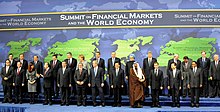2008 G20 Washington summit
| G20 Summit on Financial Markets and the World Economy | |
|---|---|

The G20 in Washington, D.C.
|
|
| Date | November 14 and 15, 2008 |
| Venue(s) | National Building Museum Washington, D.C., United States |
| Participants | G20 |
| Key points | |
|
|
The 2008 G20 Washington Summit on Financial Markets and the World Economy took place on November 14–15, 2008, in Washington, D.C., United States. It achieved general agreement amongst the G20 on how to cooperate in key areas so as to strengthen economic growth, deal with the 2008 financial crisis, and lay the foundation for reform to avoid similar crises in the future. The Summit resulted from an initiative by the French and European Union President, Nicolas Sarkozy, and the British Prime Minister, Gordon Brown. In connection with the G7 finance ministers on October 11, 2008, United States President George W. Bush stated that the next meeting of the G20 would be important in finding solutions to the economic crisis. Since many economists and politicians called for a new Bretton Woods system (a monetary management which was instituted after World War II) to overhaul the world's financial structure, the meeting has sometimes been described by the media as Bretton Woods II.
Bretton Woods II was an informal designation for the system of currency relations which developed during the 2000s (decade). As described by political economist Daniel Drezner, "Under this system, the U.S. is running massive current account deficits to be the source of export-led growth for other countries. To fund this deficit, central banks, particularly those on the Pacific Rim, are buying up dollars and dollar-denominated assets."
The notion of a "revived Bretton Woods system" was introduced in a 2003 paper by Dooley, Folkerts-Landau, and Garber, in which it is described as arising after the end of the Cold War, out of the choice of countries,
mainly in Asia, [which] chose the same periphery strategy as immediate post-war Europe and Japan, undervaluing the exchange rate, managing sizable foreign exchange interventions, imposing controls, accumulating reserves, and encouraging export-led growth by sending goods to the competitive center countries.
In 2005, Roubini and Setser argued that the system is unsustainable:
...
Wikipedia
